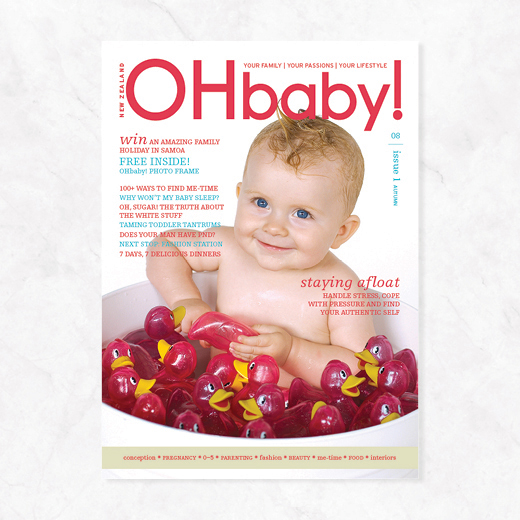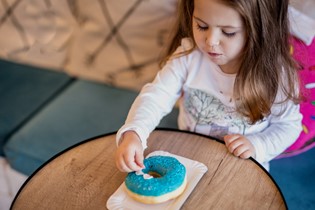Is sugar REALLY that bad?

Does sugar seem to make your kids act up, misbehave, or bounce off the walls? Guess what research says that the 'sugar high' is actually a myth.
How often have you heard another parent, or even yourself, say the words, "Oh, no, he can't have lollies. They make him hyper!" or "If she has a soda, she'll be bouncing off the walls." Birthday cake is frowned upon, biscuits are prohibited, and even juice is taboo. And if your child does partake of one of these forbidden treats, it's likely that you brace yourself for a day full of tantrums, naughtiness, and general misbehaviour, all the result of the proverbial "sugar high".
We've been interested in the relationship between nutrition and behaviour for many years, and, in recent decades, research has honed in on food additives and sugar in particular, and their suspected negative impact on children's behaviour. While some food additives have been found to have detrimental effects on children, it's sugar that often takes the blame, being labelled as the "bad guy". But does the humble sugar cube really deserve its fearsome reputation? Let's examine the scientific evidence behind the commonly held belief that sugar makes children "hyperactive".
GETTING SERIOUS ABOUT THE SWEET STUFF
Sugar, in its various forms, is present in many of the foods we eat on a regular basis, including bread, dairy foods, and even some toothpastes. For this reason, scientists have had to think carefully about precisely how to study sugar's effect on children's behaviour. They needed to be able to control and measure exactly the amount of sugar children were ingesting so that its possible impacts on behaviour could be observed and noted. In order for powerful conclusions to be drawn from studies on this topic, it is necessary to eliminate as many external variables as possible.
Therefore, studies on sugar and children's behaviour are often conducted in laboratory settings and are carefully planned. First, most of the studies described in this article involved at least two groups of children - those who were given sugar in some form, and those who were not (the "control group", who usually received an artificial sweetener). Second, children are randomly assigned to each group in order to eliminate the possibility of the groups being different in some way prior to the study's commencement. Third, and very importantly, the children and their parents - and sometimes even the experimenters themselves - are unaware as to whether the children they are observing are receiving the sugar or the artificial sweetener.
Sound complicated? Let's look at how some individual studies have made this work.
STUDYING SUGAR
In a 1994 study, Dr Mark Wolraich and his colleagues at the Department of Pediatrics at Vanderbilt University in the US set out to test the theory that sucrose (common sugar) and aspartame (an artificial sweetener) produce hyperactivity and other behaviour problems in children. They took two groups of approximately 25 children each, one group seen by their parents as "normal" in behaviour and the other group described by their parents as "sensitive to sugar". The children and their families followed a different diet for each of three consecutive three-week periods:
• Weeks 1-3: High in sucrose, with no artificial sweeteners
• Weeks 4-6: Low in sucrose, with aspartame as a sweetener
• Weeks 7-9: Low in sucrose, with saccharin as a sweetener (this was the "control" condition or placebo - i.e. the absence of both sucrose and aspartame).
Also, all of the diets were essentially free of additives, preservatives, and artificial food colourings, and the exact amount of each substance the children consumed - either sucrose, aspartame, or saccharin - was measured daily. Then, using 39 behavioural and cognitive variables, the children were rated by researchers who didn't know whether the children they were observing were considered "normal" or "sensitive to sugar" (therefore, they were unbiased in their assessments).
Interestingly, researchers found that for the children described as "sugar-sensitive", there were no significant differences in their behaviour no matter which of the three diets they were eating. The authors of the study concluded, "Even when intake exceeds typical dietary levels, neither dietary sucrose nor aspartame affects children's behaviour or cognitive function."
Surprised? Despite the relatively small groups of children involved in this study, the same conclusion has been reached by dozens of other studies, each using slightly different experiments, both prior to and subsequent to this study.
In 1995, Wolraich and his colleagues set to work again. This time, they set out to conduct a meta-analysis - meaning, they wanted to pull together the results from numerous similar studies and try to draw a firm consensus. In total, 23 carefully selected studies were analysed, involving hundreds of children. The outcome was published in The Journal of the American Medical Association, a well-regarded and prestigious publication. Their conclusion? "Sugar does not affect the behaviour and cognitive performance of children."
REALITY CHECK
By now, you might be intrigued, or even outraged by the implication that sugar doesn't actually turn your child into a terror capable of wreaking havoc on everything within a 3-metre radius after scarfing down a single chocolate bar.
Therefore, a small disclaimer: It's important to realise that these findings may not apply to all children. Wolraich and his colleagues did acknowledge that "a small effect of sugar or effects on subsets of children cannot be ruled out". Also, sugar may occasionally exacerbate an existing behaviour disorder, such as Attention-Deficit Hyperactivity Disorder (ADHD) or Oppositional Defiant Disorder (ODD).
SUGAR HIGH… OR NOT?
If we suppose that for the great majority of children, sugar itself does not cause them to be "hyper", what other reason could there be for the shrieking bundles of energy we see wildly aeroplaning around the backyard at children's birthday parties, seemingly high on cake, lollies, and fizzy drinks?
There are several possible causes for the so-called "sugar high". The most common explanation, and the one that makes the most sense, is that foods high in sugar are typically given to children in contexts which are rewarding, exciting, or celebratory - the fizzy drinks and lollies at birthday parties; the chocolates and candy canes at Christmas; or the ice cream cones on a day out with the grandparents. These stimulating environments can incite or exacerbate hyperactive behaviour in children, especially when they are participating in party games that involve running and shouting, or when parents unconsciously relax their normal behavioural expectations and boundaries for special occasions.

SEEING IS BELIEVING
Another possible explanation for the "sugar high" is that, sometimes, we see what we're expecting to see. In 1994, Dr Daniel Hoover and Dr Richard Milich of the University of Kentucky conducted an experiment with 35 five - to 7-year-old boys who were described by their mothers as "sugar sensitive". The children were randomly assigned to two study groups. In one group, the boys' mothers were told that their children had been given a large dose of sugar. In the other group, the mothers were told that their children had received an artificial sweetener. In reality, all of the children had been given the artificial sweetener.
Next, the mothers and their sons were videotaped interacting with each other, and each mother was later questioned about the interaction. Despite the fact that all of the children received the same artificial sweetener, the mothers who had been told that their sons were given sugar rated their children as significantly more hyperactive. Observations by independent observers suggested that the mothers from this group had behaved differently towards their children during the interaction in subtle ways, possibly cueing their child to behave differently also.
SO WHAT ABOUT SUGAR?
This article is not meant to be an exhaustive review of the research on sugar and children's behaviour. It does not deeply explore studies into the relationship between artificial sweetener and hyperactivity, or food additives and hyperactivity. Relationships between food and behaviour are complex, and these topics deserve further study. Children are complex, and their responses to foods vary widely. But, as concluded by Dr Marcel Kinsbourne in The New England Journal of Medicine, "Sugar clearly does not induce [disorder] where there was none before."
It's important to keep in mind that while sugar doesn't cause hyperactivity in children, that's not a free pass to let them eat as much sugar as they want. An overload of sugar makes children lethargic, grumpy, and irritable, and don't forget the dental repercussions of too much sugar in your child's diet, as well as sugar's relationship with debilitating medical conditions such as obesity and diabetes. So, while sugar can't be blamed for everything, it certainly has its place - safely at the top of the food pyramid as an "occasional" food.
Most parents would agree that attempting to modify children's behaviour by implementing entirely sugar-free diets can be difficult socially, and a burden to actually put in place. It's important for parents to carefully consider objective evidence before embarking on such diets, and think about placing a child on a temporary sugar-elimination diet and obtaining independent behavioural observations from individuals unaware of the change in diet in order to see if there is, in fact, a change. Hopefully, this article will challenge parents to delve deeper into the research behind the small talk at parties, and to not unnecessarily make sugar the "bad guy" when it comes to children's hyperactivity.
| Dr Melanie Woodfield is a child and adolescent clinical psychologist in Auckland. |

AS FEATURED IN ISSUE 1 OF OHbaby! MAGAZINE. CHECK OUT OTHER ARTICLES IN THIS ISSUE BELOW

















